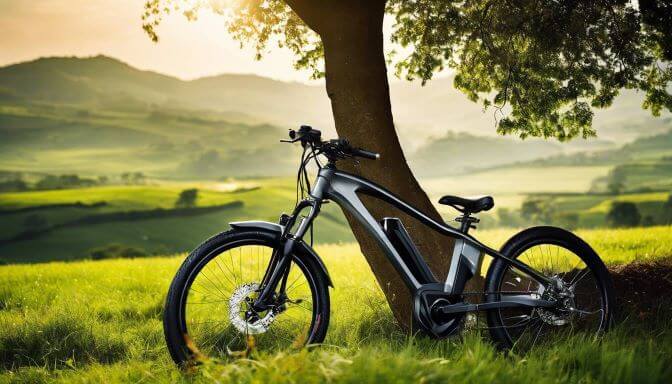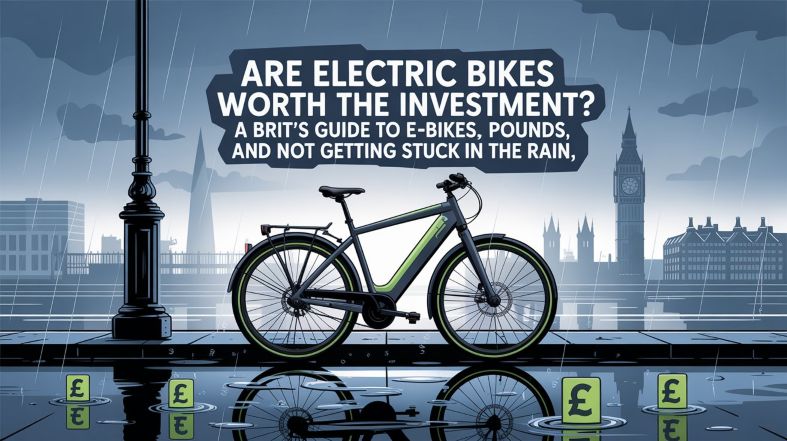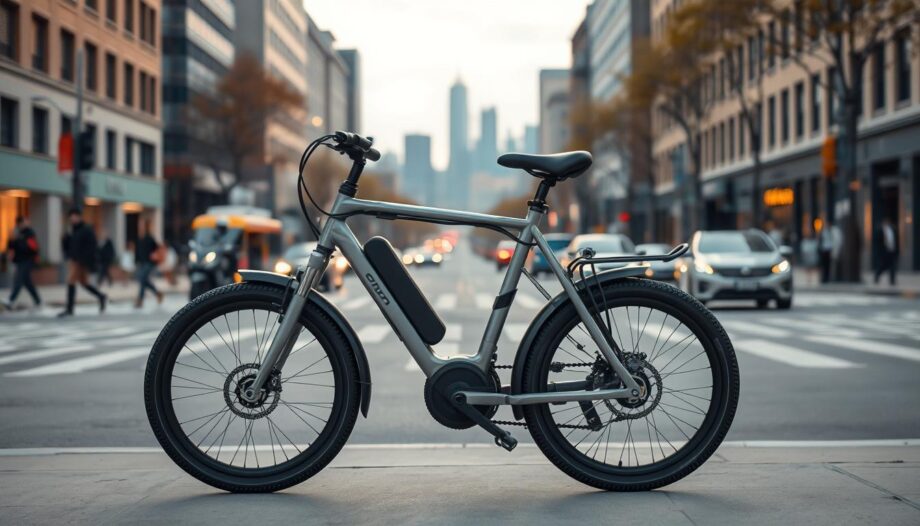Switching to electric bikes remarkably helps mitigate environmental degradation. Unlike standard vehicles, e-bikes give us the advantage of zero harmful emissions, ensuring cleaner air for our cities. More than just an eco-friendly transportation option, these innovative machines surprisingly work on both human effort and electricity, remarkably contributing towards a healthier planet. It’s like pedalling towards a greener future, literally.
Rechargeable Electric bikes offer numerous environmental benefits, including zero emissions, reduced air and noise pollution, and the potential for solar-powered operation. By choosing an electric bike over traditional vehicles, individuals contribute to a sustainable lifestyle and minimise their carbon footprint.

Environmental Impact of Electric Bikes
When it comes to the environment, traditional vehicles often produce air pollutants and greenhouse gas emissions that contribute to climate change and air quality deterioration. Conversely, electric bikes offer a sustainable and eco-friendly mode of transportation with a vastly reduced ecological footprint.
This is largely due to their use of rechargeable batteries, which only cost a few pence to recharge, making them extremely cost-effective to operate much like owning an electric scooter
Electric bikes operate on a combination of human pedalling and electric power, emitting zero tailpipe emissions. This means that as you ride through your neighbourhood or commute to work, you’re not spewing out harmful substances into the air, contributing to cleaner, fresher air for everyone.
- Compared to cars, electric bikes typically reduce greenhouse gas emissions by 22–50 grammes of CO2 per mile travelled.
- The energy consumption per mile for e-bikes ranges from 8-18 watt-hours, significantly lower than traditional vehicles.
- E-bikes also reduce air pollution compared to cars by 50-70%.
This substantial reduction in emissions can make a noticeable difference in urban environments where smog and other air pollutants are prevalent. With fewer vehicles emitting harmful fumes, the air quality improves, benefiting the health and well-being of communities at large.
In addition to reducing greenhouse gas emissions and air pollution, electric bikes also have a lower impact on noise pollution and road disruption compared to motor vehicles. This is especially significant in urban areas, where noise pollution can be a constant source of stress for residents.
Overall, the environmental benefits of electric bikes are clear – they offer a sustainable and eco-friendly transportation option that significantly reduces the negative impacts associated with traditional vehicles.
With a deeper understanding of the environmental advantages of electric bikes under our belts, let’s now explore their role in achieving zero emissions and improving air quality.
Zero Emissions and Air Quality Improvement
Our air quality matters. It affects our health, our environment, and the overall comfort of our living spaces. When it comes to ways we can reduce harmful emissions from transport, electric bikes have a particularly impressive advantage – they produce zero tailpipe emissions.
This means that when riding an e-bike, you are not contributing to the release of harmful gases like carbon dioxide, nitrogen oxides, or particulate matter into the atmosphere. In urban areas especially, this has a substantial positive impact on air quality and can significantly contribute to reducing smog and overall air pollution.
Reducing smog isn’t just about making cities look prettier; it also has significant health implications. Smog is a type of air pollution that happens when sunlight reacts with certain gases in the air. It’s made up mostly of ground-level ozone which can cause all kinds of respiratory issues like wheezing, coughing, shortness of breath, and even asthma attacks. By choosing to ride an e-bike instead of driving a car, you’re actively playing a part in decreasing these risks for yourself and others in your community.
Ever driven behind a big truck or bus and been engulfed by a cloud of smelly fumes? That’s particle pollution from fuel combustion, and it’s a direct result of using motor vehicles. E-bikes don’t contribute to this kind of pollution at all.
Additionally, with more people opting for e-bikes as their primary mode of transportation, we stand to see a decline in traffic congestion which contributes to higher levels of NO2 and volatile organic compounds (VOCs) in the atmosphere.
So, it’s not just about having fun or staying fit – it’s about making a real difference in the environmental health of our communities. Choosing to ride an electric bike over a traditional vehicle directly impacts air quality, making it safer for everyone who shares our streets and breathes the same air as we do.
As we continue our exploration of sustainable transportation options, let’s now turn our attention to the efficiency and longevity of energy sources that power these innovative vehicles.

When it comes to energy efficiency, electric bikes are significantly ahead of traditional vehicles. Our e-bikes are designed to maximise their electrical power, allowing riders to travel substantial distances without consuming large amounts of energy. Many modern e-bike models can cover a range of 20–50 miles on a single charge, making them extremely efficient and cost-effective for daily commuting and short trips.
The secret behind this impressive energy efficiency lies in the smart design and engineering of electric bikes. These bikes use advanced technologies to optimise the use of electrical power, ensuring that every bit of energy propels the bike forward. Therefore, it’s not just about covering more distance on a single charge; it’s about doing so while consuming minimal energy, making e-bikes an environmentally friendly transportation option.
Beyond their remarkable energy efficiency, e-bikes also excel in terms of battery life. The batteries used in electric bikes are durable and have a long lifespan, reducing both expenses and waste generation. Additionally, many e-bike batteries are recyclable, contributing to reduced environmental impact compared to traditional vehicle batteries, which often end up in landfills.
For instance, our top-of-the-line electric bikes at Reight Good Bikes are powered by state-of-the-art lithium-ion batteries that offer exceptional longevity and performance. These batteries are built to last for hundreds of charging cycles, ensuring that riders can enjoy reliable and sustainable transportation for years to come.
It’s also important to note that the extended battery life of e-bikes plays a crucial role in reducing overall energy consumption. By requiring fewer battery replacements and utilising each battery for an extended period, e-bikes contribute to conserving resources and minimising waste associated with frequent replacements.
In summary, the impressive energy efficiency and long battery life of electric bikes make them an attractive and environmentally responsible transportation choice for eco-conscious individuals looking to reduce their carbon footprint while enjoying reliable and sustainable mobility.
With a deeper understanding of the environmental advantages of electric bikes, let’s now pivot to exploring another sustainable option for reducing dependence on fossil fuels.
Reducing Carbon Footprint
When discussing carbon emissions, we’re referring to the gases that arise from burning fossil fuels. Cars, trucks, and buses are major contributors to these emissions when they burn petrol or diesel. These gases play a pivotal role in trapping heat in the atmosphere, consequently leading to a rise in global temperatures. And this is where electric bikes make a difference.
E-bikes don’t use any fuel directly, which signifies they produce zero tailpipe emissions. By opting for an e-bike over a car for short trips, you effectively reduce the harmful emissions that contribute to climate change. This results in reduced smog, improved air quality, and a modest respite for our planet.
For example, consider a short 5-mile trip to the store. If you drive a car, you’ll emit around 1 pound of CO2 emissions. If you opt for an e-bike instead, you produce zero emissions. While this may seem insignificant for just one short trip, if more people adopt this practise regularly, it culminates in a substantial reduction in harmful greenhouse gas emissions.
Shifting even a small portion of car trips to e-bike rides can yield a significant reduction in carbon footprints and make meaningful contributions towards achieving sustainability goals at both individual and city-wide levels.
It’s evident that using electric bikes can have a significant positive impact on reducing carbon emissions and combating climate change. Making environmentally friendly choices doesn’t have to be complex or inconvenient; in fact, choosing an electric bike over a car can be an effortless and gratifying way to make a difference each day.
Embracing environmental sustainability through transportation is just one aspect of the multifaceted benefits of e-bikes. Now, let’s delve into the myriad health and fitness advantages associated with incorporating e-bikes into your daily routine.
Health and Fitness Benefits
When it comes to exercise, every little bit contributes to better overall health. Electric bikes provide a great way to exercise, especially for those who might not be able to engage in vigorous physical activities. Riding an electric bike can be tailored to an individual’s fitness level, making cycling more accessible to people who may have physical limitations or those who are just getting started with exercising.
Our bodies are designed for movement, but modern life often relegates us to long periods of sitting. The pedal-assist feature in electric bikes encourages regular physical activity by reducing the physical exertion required for cycling. This makes it easier for individuals to incorporate exercise into their daily routines. Regular physical activity has numerous health benefits, including improving cardiovascular health, reducing the risk of chronic diseases, and enhancing mental well-being.
It’s not just about the extra push from the electric motor; riding an electric bike still involves pedalling, which engages muscles and helps burn calories. Plus, the assist function can be adjusted, allowing riders to gradually build up their strength and endurance over time.
Cycling has been shown to have positive effects on mental well-being as well. It can reduce stress and anxiety while promoting relaxation and a sense of freedom. When you add the option for electric assistance, individuals who might otherwise avoid biking due to physical challenges or limitations can experience these mental and emotional benefits as well.
For instance, imagine someone recovering from an injury or dealing with joint pain. The adjustable electric assist feature allows them to cycle without putting excessive strain on their body while still reaping the benefits of fresh air and outdoor activity.
Overall, electric bikes provide a gentle yet effective way for people of all ages and their abilities to stay active. By encouraging more individuals to choose to cycle over sedentary modes of transportation, electric bikes contribute to a healthier lifestyle while reducing reliance on cars and promoting sustainable travel options.
With the numerous health benefits they offer, electric bikes provide an inclusive approach to physical activity, enabling more people to enjoy the advantages of regular exercise while commuting or exploring their surroundings.
With a newfound appreciation for the health benefits of electric bikes, let’s now turn our attention to the economic and environmental advantages they bring in “Energy and Cost Savings.
Looking to buy an ebike or to purchase an E-scooter check out our shop
Answers to Common FAQ Questions
What is the overall impact of using electric bikes on air pollution?
Electric bikes have a significantly positive impact on air pollution. By replacing conventional gasoline-powered vehicles with electric bikes, emissions of harmful pollutants like carbon monoxide and nitrogen oxide are greatly reduced. According to a study conducted by the European Cycling Federation, if 10% of car trips in Europe were replaced by electric bike trips, greenhouse gas emissions would be reduced by 7.1 million tonnes annually. Additionally, electric bikes produce zero tailpipe emissions, contributing to cleaner and healthier air quality in urban areas.
How do e-bikes reduce carbon emissions as compared to traditional bikes or cars?
Electric bikes reduce carbon emissions compared to traditional bikes or cars by using electric motors, which are more efficient than internal combustion engines. According to a study conducted by the European Cyclists’ Federation, e-bikes emit about 8-25 grammes of CO2 per kilometre travelled, while cars emit around 101 grammes of CO2 and traditional bikes produce no emissions. Additionally, e-bikes encourage more people to choose cycling as a mode of transportation, reducing the number of cars on the road and further decreasing carbon emissions.
How do the manufacturing process and lifecycle of ebikes affect their environmental footprint?
The manufacturing process and lifecycle of electric bikes have a positive impact on their environmental footprint. Compared to conventional vehicles, electric bikes require less raw materials and energy during the production phase. Additionally, the disposal of batteries is becoming more sustainable with advancements in recycling technologies. According to a study by Transport & Environment, electric bikes have an average emissions intensity of 22-98g CO2/km, significantly lower than cars. Thus, embracing electric bikes as an eco-friendly transportation option contributes to reducing carbon emissions and promoting sustainability.
How does the use of electric-bikes contribute to sustainable transportation solutions?
The use of electric bikes significantly contributes to sustainable transportation solutions by reducing greenhouse gas emissions and traffic congestion. Electric bikes produce zero tailpipe emissions, unlike conventional vehicles, helping to improve air quality and mitigate climate change. With a growing number of people using electric bikes for their daily commute, the demand for fossil fuel-powered vehicles is reduced. Additionally, studies have shown that electric bikes can help decrease traffic congestion by taking up less space on the road and providing an alternative mode of transportation for short to medium distances. According to a study conducted in China, replacing 10% of car trips with electric bike trips could reduce carbon dioxide emissions by approximately 12 million tonnes per year.
Are there any other environmental advantages of electric bicycles besides reduced emissions?
Yes, electric bikes offer additional environmental advantages beyond reduced emissions. Firstly, they are significantly quieter compared to petrol-powered vehicles, reducing noise pollution in urban areas. Secondly, electric bikes have lower energy consumption compared to cars, supporting energy conservation efforts. Finally, they require less road space and parking area than cars, promoting efficient land use and reducing the demand for concrete and asphalt.





